Val Town Newsletter 1
Welcome to the 1st Val Town newsletter!
By way of reminder, Val Town gets you fastest from idea to deployed cloud script. Create scheduled functions, email yourself, and persist small pieces of data — all from the browser, with instant deploys, and never thinking about infrastructure.
In the last three months (since the 0th Newsletter), we’ve gained focus around the product’s early use-cases, found a couple fantastic early adopters, shipped major features, grew the founding team, and are working on an exciting roadmap for 2023.
Programmatic notifications
Our first challenge was finding use-cases for Val Town, while keeping it a generic programming tool. After dozens of early-adopter conversations, stumbled onto programmatic notifications:
- Poll some source of information via
fetch(Hacker News, RSS feeds, Twitter, etc) - If there are results, email them to yourself via
console.email - Schedule it to run on an interval, like every hour
Most people can think of at least one kind of custom notification they’d like, and it takes just a couple of minutes to fork one of these to suit your purposes.
Hacker News
The Hacker News Agolia Search API is free and unauthenticated, so it’s really easy to make queries. We made a tutorial around it, but it was mostly ignored until Kartik taught himself JavaScript to get it to work for him! We then built a whole website around it (hnfollow.com) and launched it to Hacker News. We made the front page, got a couple dozens users, and then were removed from the front page, because Val Town “is much more interesting than an HN email alert.” The launch of Scheduled Vals has made this even easier (probably deprecating hnfollow.com). Now you can setup HN Alerts by forking a single val:
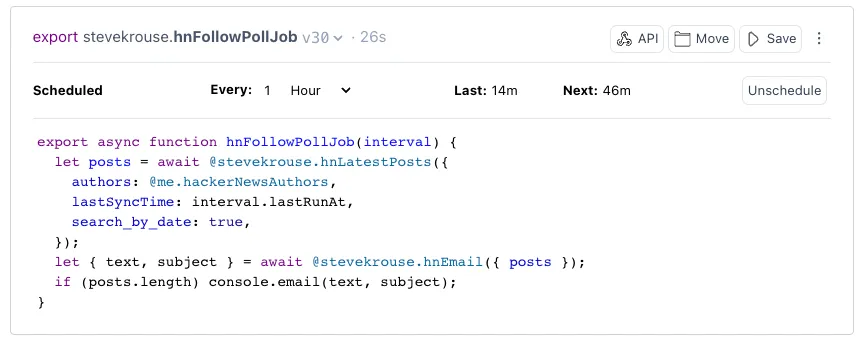
RSS
RSS has been making a comeback, particularly since the mess at Twitter. James mentioned that he has a RSS to email Zapier Zap, and it got me thinking that this is something Val Town would really excel at. This is where the idea for Scheduled Vals came from, as a generalization of HN Follow, but packaged up in a single val. Of course, we can’t compete against full RSS readers, but if you simply want an email notification for a new post in an RSS feed, I think we’re compelling. I put all mine in an object and then looped over them.
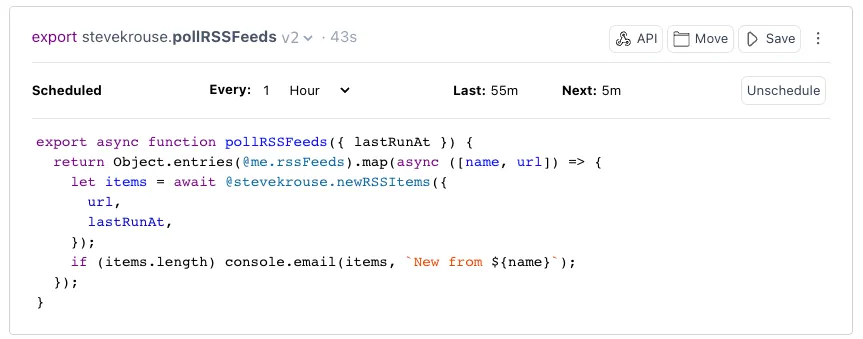
New Citations
Ernest programmed a function to get notifications when there are new citations to a particular scientific paper.
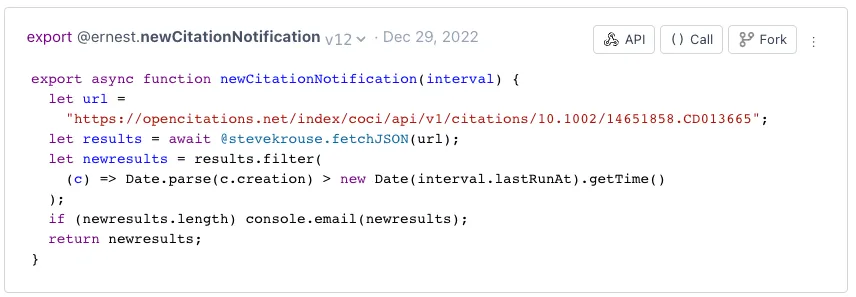
Air Quality
Lev programmed a bot that helps folks in San Francisco know when they should close their window due to poor air quality during fire season.
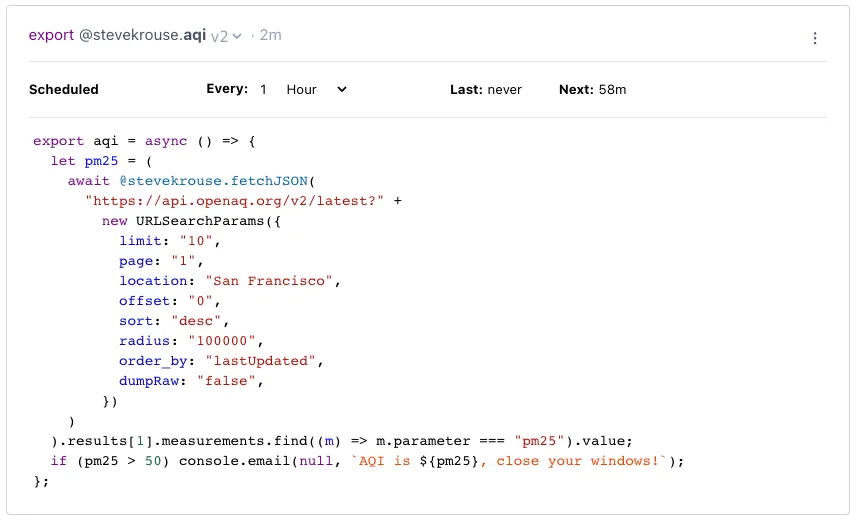
Webhooks
Of course not all notifications need to be run on a schedule. Some notifications come in the form of webhooks, like from Stripe, your app, database, or really anywhere. Val Town is quite good at turning an HTTP request into an email to yourself. For example, I get emailed when anyone signs up to Val Town or certain errors occur.
All the notifications
There are so many other exciting similar use-cases. Once you start thinking of them, it’s hard to stop:
- Email notifications when certain folks post on Twitter or certain keywords are mentioned
- Notifications when any asset you own changes price by a large % suddenly
- I’ve long wanted to rebuild Devon’s smallworld.kiwi in Val Town
- Morning alert if it’s going to rain that day or if you need to wear sunscreen
- A “subscribe to thread” twitter bot that will notify you when a thread gets new subtweets (if you @mention it like you would “@threadreaderapp unroll”)
What are you waiting for? Go setup your own programmatic notifications! If you want company while you code, free to schedule time to pair program with me to set these up. It’s super useful for me to watch folks use the tool.
Product improvements
A big focus for this year is doing a better job of blogging and celebrating each product improvement as they happen. Given that we didn’t do this over the last three months, here are the highlights!
Scheduled Vals
Our initial interface for creating intervals was simply Javascript’s
setInterval, but made persistent. The downside was that you had to keep track
of your interval IDs and be careful about starting, editing and deleting
intervals. Now we have a one-click interface for creating & editing intervals
that are automatically attached to vals.
TypeScript
We’ve rolled out TypeScript by default to all vals. It won’t prevent you from running code with type errors, but will give you (hopefully) useful type errors, even without adding any annotations.
Evaluation History
We now save every single evaluation of every val, be it a function or piece of state, no matter how it’s triggered. It’s been a great aid to debugging, and we have big dreams for where we can take observability in the future (replayability/omniscience). You can see evaluation history on the pages of vals that you own:
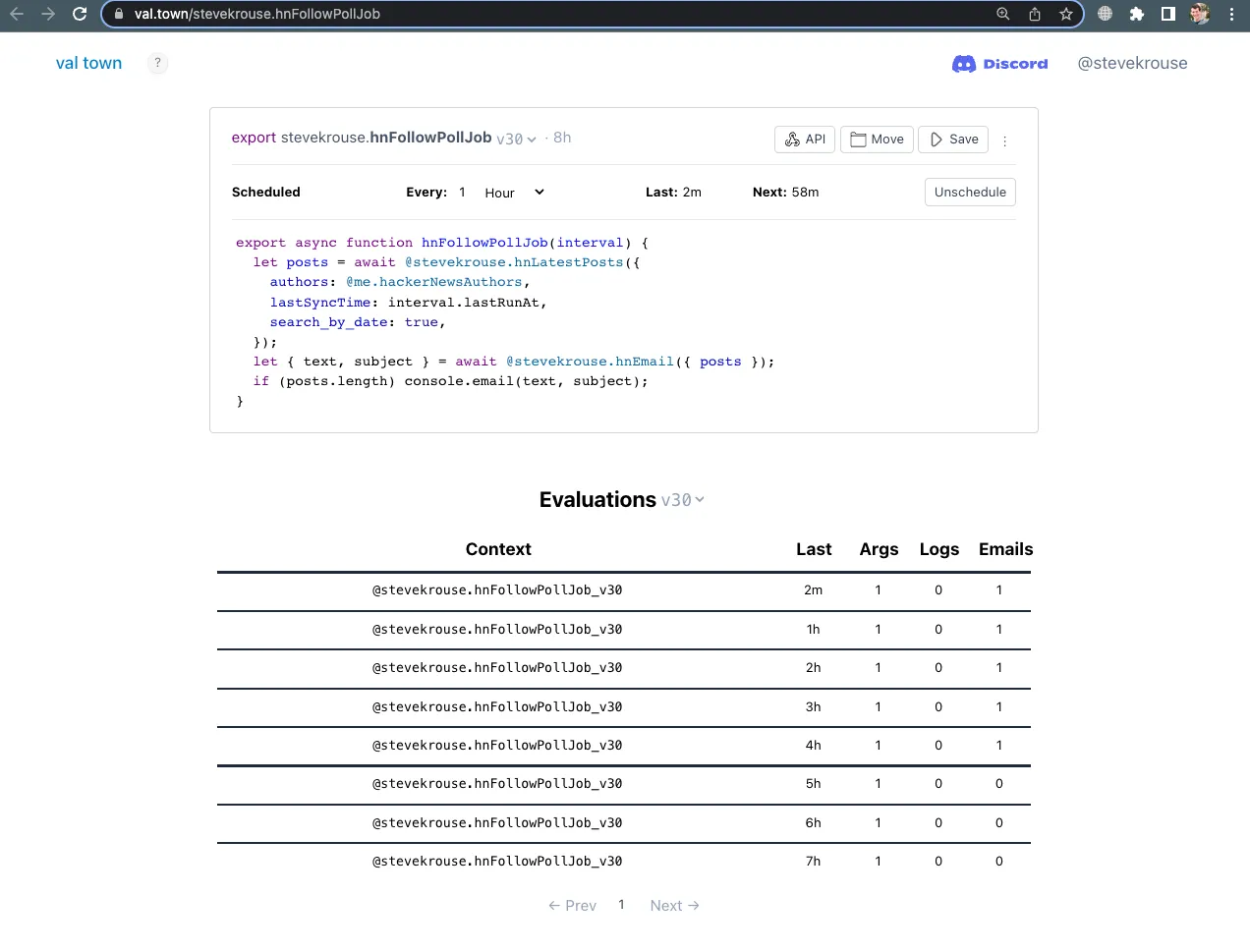
You can click into an evaluation to see its inputs, outputs, logs, emails, and errors. We also let you explore its parent evaluation and any sub evaluations, which is like jumping up and down the call stack.
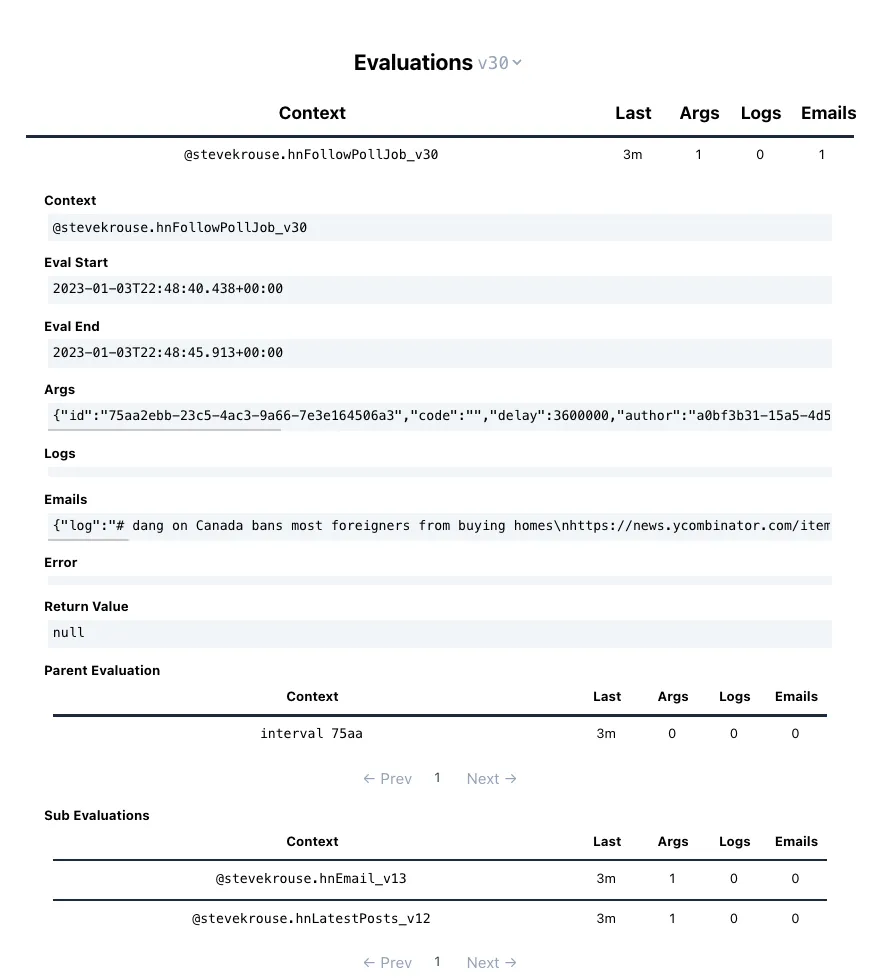
Folders
We had a janky version of “notebooks” before, but we really needed a proper way to organize your vals. Nobody felt this more than I did with my 1000+ vals. You can now move vals into folders, recursively!
Secrets
By popular demand, there is now a special, safe place for you to put your secrets, API keys, and auth tokens. You can find this page by clicking your username (in the top-right corner) or by going to https://www.val.town/@me.secrets.
Smaller upgrades
- Automatically retry
fetchrequests when they fail before even connecting, all from randomly assigned residential proxies, virtually eliminating a very common class of error. - Val are either functions or a single statement. However now if you write a series of statements, we will detect it, wrap it in a function, and call that function for you.
- We added more versatility in ways to pass arguments via the API, including an ExpressJS API. (But we need better docs on this.)
- Rebuilt the architecture for running intervals and timeouts for reliability.
- Added (mostly accurate) line numbers in error messages.
- Built a more intuitive UI for logging in and out.
- We sped up a number of slow queries, some by 14,000x.
- Added & then removed in-app chat.
- Added dozens of tests.
Company
The founding team is coming together!
- Steve Krouse (me)
- André Terron, engineering, joined in Oct, and shipped many of our biggest new features
- Rodrigo Tello, design, whose first day was yesterday 🥳
- & potentially one more in engineering!
We built a lot in the last ~4 months the company has existed, but I can’t wait for what we will accomplish as a team of three or four.
We have raised a small amount from a single investor who instigated this project and is aligned with the kind of company we want to build: a trusted contributor and partner to open-source and the ecosystem, valuing open-standards and credible exit, and leaving users in a good place no matter what happens to the company.
This essay on End-Programmer Programming is probably the closest thing we currently have to a company mission statement.
2023
The focus for 2023 is product and growth: making our scripting tool very fun and useful, and getting lots of folks using it.
I think the product as is, modulo a bit of polish, could be useful to 10-100x more folks than are currently using it (~10), so our initial focus this year will be gearing up for many more users. We need to get better at some of the too-often-overlooked sides of developer tools: docs, stability, polish, release notes, public issue tracking, error tracking, logs & analytics, more automated tests, open-sourcing more pieces of the product, more tweeting about the product & celebrating what folks are doing with it, etc. There are a lot of other low-hanging fruit to enable growth, such as being able to try the product without creating an account, pretty share preview links, and improvements around friction areas, such as editing functions (with confidence that you won’t break downstream references) and useful notifications when your functions do throw errors.
I don’t like to plan too firmly, because I’m a big believer in being surprised by what users do with the tool and what they want from it, but my personal instinct is that the next big feature effort we’ll add (maybe in Q2) is building in first-class OAuth flows into your favorite tools, so you don’t have to waste time with authenticating to do Zapier-like automations in Val Town.
Happy programming 👨💻👩💻
Be sure to jump into our Discord to share tips, bugs, feature requests, and show off your work!
If you want to pair program on a project in Val Town, please don’t be shy! Just reply to this email or find a time on my calendar.
Steve
Subscribe
The easiest way to subscribe to Val Town is to sign up for an account on val.town, and then opting in to receive our newsletter as your set your username. You can also sign up via this link.
Edit this page